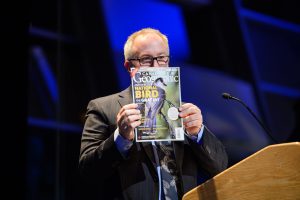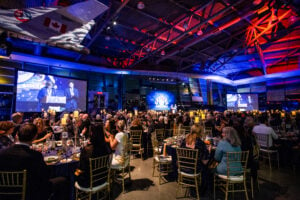
People & Culture
Eight awesome things that happened at the 2018 RCGS Fellows Dinner
Remembering Louie Kamookak, a new Explorer-in-Residence and other highlights from the 89th Annual College of Fellows Dinner
- 1633 words
- 7 minutes
People & Culture
The 2022 Massey medallist has dedicated his career to documenting environmental change in the Arctic

John England’s lifelong fascination with the Canadian Arctic took root when he was just 18 years old. The year was 1965, and England, an undergrad at the University of Windsor, Ont., recalls feeling a sense of profound wonder the second his feet hit the ice during a field session to Baffin Island’s fiords. Over the course of his 50-plus-year career, England — now Professor Emeritus in the Department of Atmospheric and Earth Sciences at the University of Alberta — has had an indelible impact on our understanding of the Arctic. In recognition of this lifetime of achievement, the Royal Canadian Geographical Society awarded England its annual Massey Medal in 2022, citing his contributions to documenting environmental change in the Arctic from the Ice Age to the present day.
The great joy in doing science is grounded in interacting with the people you’re with. It’s enjoying the full tapestry of your life at the moment, which is sharing a cup of coffee, sitting in a tent telling stories, going to a community and talking to an Elder. You cannot separate any of that from the science you’re doing.
We climbed up this one mountain on Bellot Island. There was a beautiful stone cairn about 10 feet tall. In the rocks nearby was this little metal cylinder about a foot long, and I lifted it out. We unthreaded the top, and we could see that there was a note inside. The first thing we saw was “Captain Stephenson, March 10, 1876” [a British expedition that explored the coasts of Greenland and Ellesmere Island]. Our eyes popped out; it was just such a discovery. The next year, I discovered two handwritten notes from Adolphus Greely [from the Lady Franklin Bay Expedition] in 1882 with many details. I brought them to the Archives in Ottawa.
We’re watching global climate change turn high latitudes on their ear — everything from permafrost to sea ice to glaciers to rivers. Part of the Laurentide Ice Sheet has survived on the landscape, insulated beneath a metre of debris. Now, unprecedented summer warmth is reaching down into the buried ice, causing it to melt and forcing formerly stable hillsides to slide away, further exposing the buried ice. So much of the landscape is falling apart, and enormous amounts of sediment are going into the oceans and lakes. What used to be clear blue lakes are now turning into Tim Hortons double doubles.
I proposed the park in a handwritten letter in 1972, written from St. Patrick Bay on Ellesmere Island [Umingmak Nuna] in Nunavut while I was working on my PhD. I wrote to Parks Canada, and lobbied for over 10 years until they finally hired me to do a natural resource inventory and draw the boundaries. [The park was established as Ellesmere Island National Park Reserve in 1988 and renamed Quttinirpaaq when Nunavut was created. It became a national park in 2000.]
In 2007, I found this odd little shell I’d never seen in the Arctic before. That shell, as it turns out, answers a long-standing question as to when the ocean first rose high enough for Pacific water to re-enter the Arctic Ocean, severing the Bering Land Bridge. That tells me, never count out surprise. Never assume that you know for sure until something like that comes and taps you on the shoulder in such a beautiful way.
Are you passionate about Canadian geography?
You can support Canadian Geographic in 3 ways:

This story is from the July/August 2023 Issue

People & Culture
Remembering Louie Kamookak, a new Explorer-in-Residence and other highlights from the 89th Annual College of Fellows Dinner

People & Culture
Celebrating new partnerships, milestone anniversaries and a bird for Canadians on geography's biggest night

People & Culture
Celebrating iconic collaborations, exciting partnerships, a new RCGS president and many more memorable moments from the 93rd College of Fellows Annual Dinner

People & Culture
Exploration, education, new Fellows and the launch of RCGS Resolute: here are some of the highlights from the 2017 RCGS Fellows Dinner and AGM